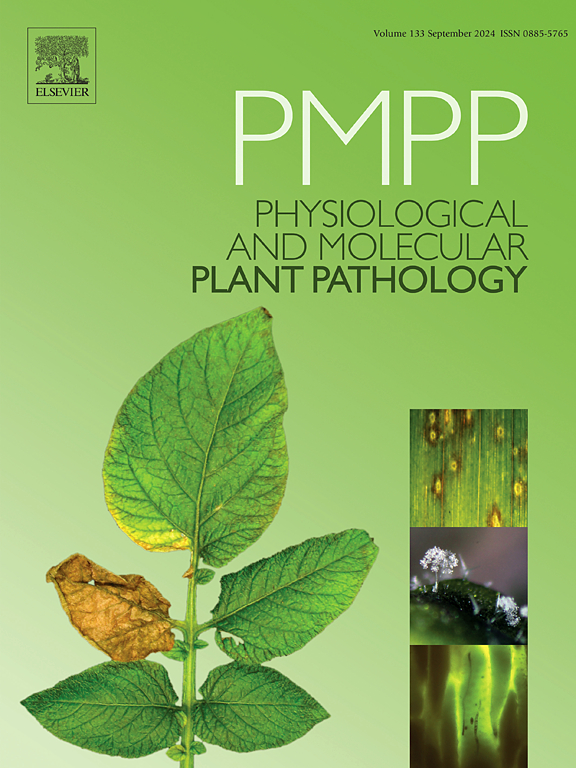甘薯对生物胁迫的防御反应的转录、激素和系统水平调节
IF 3.3
3区 农林科学
Q2 PLANT SCIENCES
引用次数: 0
摘要
甘薯(Ipomoea batatas L.)是一种以其营养价值和农艺学适应性而闻名的全球粮食作物,但其产量受到多种生物胁迫因素的显著限制。致病性真菌、细菌、病毒、害虫和线虫共同降低全世界的生产力和质量。了解红薯防御机制的复杂分子机制对培育红薯改良品种至关重要。这篇综述提供了对当前知识的全面综合和批判性观点,包括主要甘薯生物相互作用的转录组学研究的关键发现,突出了特定的宿主分子反应。随后,本文讨论了关键转录因子(TF)家族(如NAC、MYB、WRKY、BBX)和协调这些防御的植物激素途径(茉莉酸、水杨酸、乙烯、油菜素内酯)的作用和相互作用,并在适当的地方引用了初始转录组学证据。该综述进一步探讨了系统生物学方法如何整合多组学数据、系统遗传学(包括宿主和病原体基因组见解)、利用CRISPR-Cas的功能基因组学、微生物组分析和机器学习,为这些复杂的防御网络提供全面的见解。然后,我们讨论了持续的挑战,包括基因组复杂性和将研究结果转化为综合压力下的现场应用。最后,我们概述了未来的展望,强调综合研究策略,以提高红薯的抗灾能力和全球粮食安全。本文章由计算机程序翻译,如有差异,请以英文原文为准。
Transcriptional, hormonal, and systems-level regulation of defense response in sweet potato against biotic stresses
Sweet potato (Ipomoea batatas L.), a global food crop renowned for its nutritional value and agronomic resilience, faces significant yield constraints from diverse biotic stressors. Pathogenic fungi, bacteria, viruses, insect pests, and nematodes collectively diminish productivity and quality worldwide. Understanding the intricate molecular mechanisms underpinning sweet potato defense is crucial for developing improved cultivars. This review provides a comprehensive synthesis and critical perspective on current knowledge, with key findings from transcriptomic studies across major sweet potato biotic interactions, highlighting specific host molecular responses. Subsequently, it discusses the roles and interplay of crucial transcription factor (TF) families (e.g., NAC, MYB, WRKY, BBX) and phytohormonal pathways (jasmonic acid, salicylic acid, ethylene, brassinosteroids) that orchestrate these defenses, referencing the initial transcriptomic evidence where appropriate. The review further explores how systems biology approaches, integrating multi-omics data, systems genetics, including host and pathogen genomic insights, functional genomics leveraging CRISPR-Cas, microbiome analysis, and machine learning, provide holistic insights into these complex defense networks. We then discuss persistent challenges, including genome complexity and translating findings into field applications under combined stresses. Finally, we outline future perspectives, emphasizing integrated research strategies to enhance sweet potato resilience and global food security.
求助全文
通过发布文献求助,成功后即可免费获取论文全文。
去求助
来源期刊
CiteScore
4.30
自引率
7.40%
发文量
130
审稿时长
38 days
期刊介绍:
Physiological and Molecular Plant Pathology provides an International forum for original research papers, reviews, and commentaries on all aspects of the molecular biology, biochemistry, physiology, histology and cytology, genetics and evolution of plant-microbe interactions.
Papers on all kinds of infective pathogen, including viruses, prokaryotes, fungi, and nematodes, as well as mutualistic organisms such as Rhizobium and mycorrhyzal fungi, are acceptable as long as they have a bearing on the interaction between pathogen and plant.

 求助内容:
求助内容: 应助结果提醒方式:
应助结果提醒方式:


